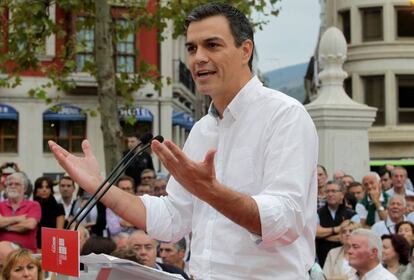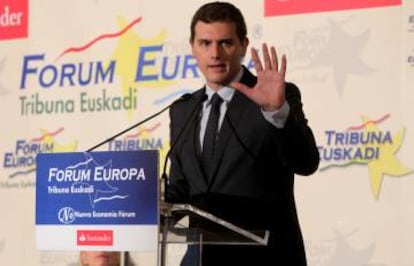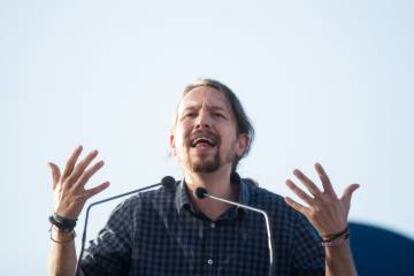Political deadlock in Spain takes toll on increasingly divided parties
Main opposition Socialists cannot agree on whether to let conservatives form a government

After two general elections and the threat of a third looming ever closer, a nine-month political stalemate in Spain is taking its toll on all of the country’s political parties.
The conservative Popular Party (PP), which won the most votes in the December and June elections, but fell short of a majority both times, is no closer to finding the necessary allies to put together a fully functional government.
It makes no sense to sell out on our principles or to betray our ideological code
Emiliano García-Page, premier of Castilla-La Mancha
And the main opposition Socialist Party (PSOE) is increasingly divided over whether it should try to cobble together an alternative majority through deals with regional parties – some of which favor independence from Spain – or whether it should simply let acting prime minister Mariano Rajoy form a minority government.
The secretary general of the PSOE, Pedro Sánchez, is becoming increasingly isolated in his defense of the first option. Six of the seven Socialists serving as regional premiers in Spain do not want Sánchez to attempt a coalition with the left-leaning anti-austerity Podemos, the emerging center reform party Ciudadanos, or others.
It would not even be the first time he has tried. Following the elections of December 20, 2015, Sánchez reached a preliminary deal with Ciudadanos, but the combined congressional presence with the Socialists was not enough for a majority and Podemos refused to join the alliance.

The deadlock led to a second national election on June 26, with similar results. This Thursday, at a party event in the Basque city of Bilbao, Sánchez made a public appeal to Pablo Iglesias and Albert Rivera, the leaders of Podemos and Ciudadanos respectively, to “work together to throw out the government of Mariano Rajoy.”
“There are many things that unite us; it’s worth it. Let’s get rid of the cross-vetoes and get a government of change, a government of democratic regeneration, up and running in this country,” said Sánchez, alluding to Podemos and Ciudadanos’ complete refusal to work with one another.
But it seems like a growing chorus of voices within the PSOE is saying enough is enough. Some even hope that the outcome of the regional elections being held this Sunday in Galicia and the Basque Country, where the PSOE is not expected to do well, will make Sánchez change his mind.
Emiliano García-Page, the regional premier of Castilla-La Mancha, said in an interview in the Spanish-language El Huffington Post that the Socialist Party “cannot govern at any price, or give the impression that its only goal is to reach La Moncloa [the seat of government].”
“It makes no sense to sell out on our principles or to betray our ideological code,” he added, alluding to many PSOE officials’ unease at partnering with Podemos, which is alone among the main parties in defending the right of Catalans to hold a referendum on self-rule in Catalonia.
There are many things that unite us. Let’s get a government of change
PSOE leader Pedro Sánchez
For his part, Ciudadanos leader Rivera has already warned Sánchez that he will not be supporting him again, and asked him not to attempt an alternative governing coalition.
“Nobody deserves a prime minister who wants to form a government at any price, who wants to bring together 44 parties, to rule with 85 seats in Congress and with a party that is clearly divided between those who want to go into the opposition and those who want power at any price,” said Rivera.
Strain on Podemos
Podemos, which is made up of dozens of grassroots organizations, is also feeling the strain after nine months of deadlock. On Thursday, party leader Pablo Iglesias issued a statement that underscored his growing rift with the party’s number-two official, Iñigo Errejón, over the issue of whether to negotiate with the Socialists or not.

“As long as I am secretary general, we are going to talk to the PSOE on an equal footing,” insisted Iglesias.
Meanwhile, the acting prime minister of Spain appears to be sitting back and letting events play out.
Close aides said that Rajoy is neither surprised nor particularly alarmed at this latest attempt by the Socialist leader to put together an alternative governing coalition “with separatists and extremists.”
Rajoy has described this plan as “nonsense” but admitted that “mathematically it could work” in terms of congressional seats.
The acting PM has also admitted that he has no plan B to attract allies. Instead, he has adopted a do-nothing strategy while accusing other parties – particularly the PSOE – of the deadlock because of their refusal to support him.
If nothing changes, Spaniards will be called to vote in a third election scheduled for Christmas Day. Polls are predicting a historically low turnout, reflecting taxpayers’ growing weariness with their politicians.
English version by Susana Urra.
Tu suscripción se está usando en otro dispositivo
¿Quieres añadir otro usuario a tu suscripción?
Si continúas leyendo en este dispositivo, no se podrá leer en el otro.
FlechaTu suscripción se está usando en otro dispositivo y solo puedes acceder a EL PAÍS desde un dispositivo a la vez.
Si quieres compartir tu cuenta, cambia tu suscripción a la modalidad Premium, así podrás añadir otro usuario. Cada uno accederá con su propia cuenta de email, lo que os permitirá personalizar vuestra experiencia en EL PAÍS.
¿Tienes una suscripción de empresa? Accede aquí para contratar más cuentas.
En el caso de no saber quién está usando tu cuenta, te recomendamos cambiar tu contraseña aquí.
Si decides continuar compartiendo tu cuenta, este mensaje se mostrará en tu dispositivo y en el de la otra persona que está usando tu cuenta de forma indefinida, afectando a tu experiencia de lectura. Puedes consultar aquí los términos y condiciones de la suscripción digital.








































